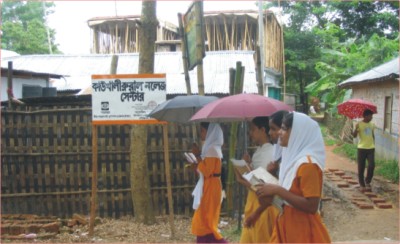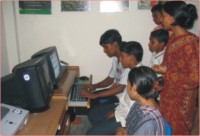Feature
Educational institutes could be the heart of Telecenter
Mohammad Golam Nabi

Many of us believe that proper use of Information and Communication Technology (ICT) can contribute significantly to our national development. ICT has strong potentiality to promote economic growth and can facilitate the integration of Bangladesh into the global economy. Through the use of ICT in an innovative and practical way we can combat poverty and can develop our rural areas. We also believe that educational institutes especially colleges and universities can be effective partners in applying ICT for the development of Bangladesh.
Bangladesh and ICT
We are talking about the potentiality of ICT in Bangladesh's development. Our Government has already produced some good documents in favor of ICT promotion in Bangladesh. We have our ICT policy document, telecommunication policy, broadband policy, we have draft-broadcasting act and many other important documents related to ICT but we do not have proper action plan. We need to develop action plans in ICT sector including hardware sector, software sector, internet promotion, promotion of telephone sector and of course promotion of telecenters, as a vehicle for the dissemination of information to the rural people.
Telecenters are just at a take-off point. Eighty percent of our population still lives in rural areas. They need the information most. Internet could be our next most appropriate vehicle to disseminate information. We can put internet facilities in the telecenters. We have our optical fiber line. Now we need to make a practical action plan to implement all of our resources in an appropriate manner. To do this we need to create internet hubs at least in the 6 divisions.
We should remember we have a population of 160 million who could be our potential user and customer. At present almost 90% of all internet users in Bangladesh live in big cities such as Dhaka, Chittagong, Barisal, Khulna, Sylhet, Bogra, Rajshahi, Rangpur and Comilla and Mymensingh. This imbalance also reflects the level of economic and educational development in Bangladesh.
The information isolation of the poor social groups is sometimes more serious than the physical constraints they face. So, if we really want to alleviate poverty we need to identify information needs of rural entrepreneurs as a high priority for development. If we fail to read the needs of our rural people we will fail completely in the long run. To help our rural people we need to develop proper public facility where the masses can and use ICT and get their required information. To do this we do not need to invent new things. There are examples for us in many countries. What do we need? We need to implement one or all the existing models or concepts and build information access points for rural masses. Telecenters could be the most appropriate solution.
Telecenter movement in Bangladesh
Telecenter is a new concept in Bangladesh though it was established 21 years ago. The first telecenter was established in Sweden in the year 1985. For a long time it was a tool for rural development in Europe. Telecenter movement has spread over Asia and Africa and became popular very quickly. Our neighboring country India has started to establish one telecenter in each village under their famous movement Mission 2007.
They will establish a total of around six lac telecenters in their country. A good number of organizations have come up to implement the project including world famous multinational companies, NGOs, Universities, research organizations and many more. It is a collaboration of government, NGOs, private sector and educational institutes.
 Bangladesh could follow the same model. In Bangladesh we find there are NGOs who are trying to implement telecenter concepts in Bangladesh with different names and approach. For example, BNNRC gave the name Rural Knowledge Center (RKC), YPSA is running the telecenter under the name Multimedia Center; Katalyst gave the name GHAT, on the other hand D.net calls their telecenter Pallitathya. Dhaka Ahsania Mission calls them Community Learning Center and Grameen Phone called them Community Information Center (CIC). Their name and way of work maybe different but their goal is same: to give information to the rural poor by using modern information and communication technology. People can go there, they can use the computers, internet, mobile phone, land phone, and other technologies to get access to information or people or resources. These all are creating access points for general people at an affordable cost. Because it is established and run in the sharing theory, it is cheaper as compared to individual home ownership of ICTs and individual network use fees. Bangladesh could follow the same model. In Bangladesh we find there are NGOs who are trying to implement telecenter concepts in Bangladesh with different names and approach. For example, BNNRC gave the name Rural Knowledge Center (RKC), YPSA is running the telecenter under the name Multimedia Center; Katalyst gave the name GHAT, on the other hand D.net calls their telecenter Pallitathya. Dhaka Ahsania Mission calls them Community Learning Center and Grameen Phone called them Community Information Center (CIC). Their name and way of work maybe different but their goal is same: to give information to the rural poor by using modern information and communication technology. People can go there, they can use the computers, internet, mobile phone, land phone, and other technologies to get access to information or people or resources. These all are creating access points for general people at an affordable cost. Because it is established and run in the sharing theory, it is cheaper as compared to individual home ownership of ICTs and individual network use fees.
The content issue: universities can contribute most
We need quality information, content and data. ICTs can help us expand the reach and impact of information but it cannot generate quality information by itself. Internet is becoming the popular medium of collecting information. But some questions are increasingly come forward. Is the Internet content relevant for us? Is it accessible to our people? Is it understandable to our audience? Is it accurate or biased? Is it affordable? There are many more such questions.
Now, the question is who will solve it for us? Every day around 200 thousand new web pages are included in the Internet. How many pages meet the above questions? How many pages are appropriate for us? Roughly Zero. We need to concentrate our efforts.
Who will do it for us? The answer could be the young generation. They have the energy, wisdom, courage, patience and more over they can volunteer. A person like me cannot volunteer, because I have a family to maintain and need to earn. The situation is different for the students. Their active volunteering can change the whole scenario of Bangladeshi information needs.
Content development is a huge task where Universities can help enormously. Universities are the only place from where we can expect voluntary services in many forms. They can help us during their term preparation, they can develop content as part of their project, and they can contribute during their leisure. Many other options are open for them.
Our urban universities can launch active partnerships with rural educational institutes that have the capability of assessing people's information needs and mobilizing the resources to make it available. Both parties can be benefited in this process. Exchange of knowledge can happen.
They can conduct research on community information needs, on the present situation on information delivery systems, on development issues, they can develop information packages for their community, they can use their academic knowledge to prepare education packages for the community, they can translate information in Bangla for the less educated people, they can do internship with telecenters and help to disseminate information to the community, they can collect data on the information needs of people and prepare case studies that will help NGOs and GoB to raise funds, they can prepare information packages for the community as well as for the donors. They can volunteer to design and execute ICT training programs for various community groups, especially those who cannot afford ICT training.
In an UNDP document it is mentioned that 'Universities are acting as the basic knowledge hub for information for all. They are generators of knowledge through research, analysis, information integration, and discussion; they store knowledge in their libraries; and they pass on knowledge and information through formal instruction, forums, non-formal education, and publications and other media. They are also leading agencies for distance-learning initiatives. Thus it is a paradox that they play an inconspicuous role in the cultivation of content for the ICT and telecenter movement, especially in relation to poverty alleviation and community development.'
Many of us complain about the big divide in our society between the rural and urban education system. Partnership between urban and rural educational institutes for building knowledge hub or web pages will give us the opportunity to minimize the gap. NGOs, Donors and development partners could come forward with required funds to implement the projects.
(Mohammad Golam Nabi is an Independent Journalist and ICT4D Consultant, who can be reached by gnabi1969@yahoo.com)
| 